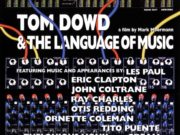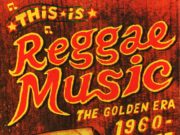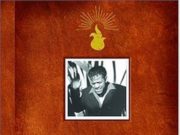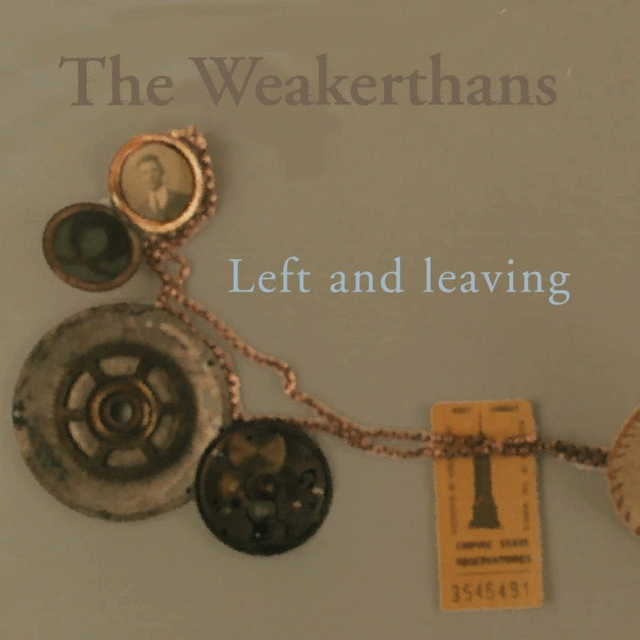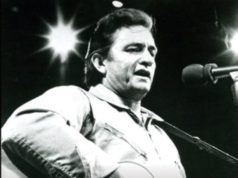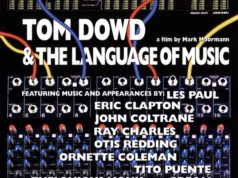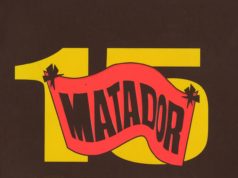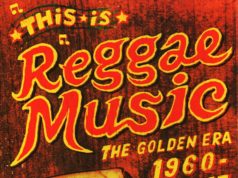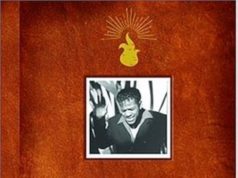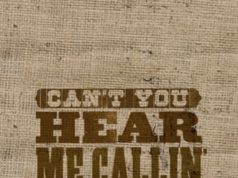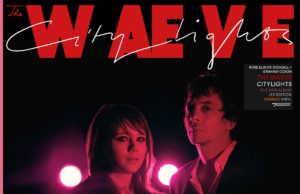Two decades ago, I was clearly having an indie music week — new albums from Weakerthans, Arab Strap, Archers of Loaf and other independent artists were spinning away in my portable CD player. Here’s what I had to say about them back then (with some minor editing):
 The Weakerthans
The Weakerthans
Left & Leaving
Everybody has to grow up sometime. Even punk rockers. John K. Samson of The Weakerthans knows that from personal experience. Like many a musician, the song of his youth was loud, fast and rebellious — the political punk anarchy of his previous band, Propagandhi. Then, again like many a musician, there came a day when Samson wanted to express more personal and complex emotions, to tell tales that couldn’t be set to a driving pogo-beat and distorted power chords.
His first attempt with his new band The Weakerthans was 1997’s Fallow, an engaging document of edgy, post-punk romanticism whose expressively literate, heartfelt tales of urban alienation and unfulfilled potential vaulted the band to the forefront of the city’s music scene. Now, Samson and co. have cemented that position with the tender, inspired and inspiring sequel Left and Leaving, an album as impressive and vital as any this city has produced.
Note I said sequel and not followup. Left and Leaving isn’t your typical sophomore outing; lyrically, musically and especially thematically, it picks up almost exactly where its predecessor left off. Fallow’s final words were “the lease runs out next week.” Left and Leaving begins with Everything Must Go!, a poppy ballad in the form of a classified ad for a karmic garage sale. “I need to pay my heart’s outstanding bills,” intones Samson over a gentle groove, offering to trade “the outline to a complicated dream of dignity … (for) a sign that recovery comes to the broken ones. Or best offer.” Those poetic lines elegantly outline the subtle yet distinct thematic shift on Left and Leaving. Like Fallow’s tragic protagonists, its narrators are in deep. But they aren’t simply drifting and drowning in their sorrows ‚ they’re fighting the tide, struggling to keep their heads above water.
But even if Samson’s heroes don’t realize their ambitions — and titles like History to the Defeated and Exiles Among You make it clear they don’t — he and The Weakerthans seem to have achieved everything they set out to do musically on this disc. Swelling their guitar/bass/drums arrangements with keyboards, steel guitars, organs, synthesizers, percussion and glockenspiel, Samson, bassist John Sutton, drummer Jason Tait and guitarist Stephen Carroll spin a richly textured, multi-layered work whose sonic depth equals that of its lyrics. Credit also goes to producer Ian Blurton, who knows when to flesh out the sound and put harmonies behind Samson’s thin, reedy tenor, and when to pare it to the bone and let John’s voice stand alone in all its fragile vulnerability.
It’s the latter configuration that dominates Left and Leaving. Next to Fallow’s balance of ballads and brittle indie-rock, this is a quiet, moody affair. Few tunes besides the propulsive, chiming Aside and the new wavey Watermark flat-out rock. More often, these songs gently simmer and shimmer, with rootsy, undistorted guitars and drums lightly brushed instead of pounded. Closing track Slips and Tangles, a construction of dirge-y piano, percussion and saw, wouldn’t be out of place on a Tom Waits disc.
Fans who embraced Samson’s angrier young conglomerate may miss the loud, fast rebellion of old. But whatever Left and Leaving lacks in sonic heft, it more than makes up for in musical and emotional impact. Like many a musician, Samson has learned you can yell all you want — but people really start listening when you whisper.
 Arab Strap
Arab Strap
Mad For Sadness
These Scottish mope-rockers’ sordid, seductively bleak studio albums make Morrissey seem as giddy as The Monkees. So when it comes to a live album, well, let’s put it this way, Mad for Sadness isn’t exactly KISS Alive. But the lack of drum solos, explosions and banal between-song patter doesn’t make this 1998 performance from singer Aidan Moffat, guitarist Malcolm Middleton and a backing trio any less transfixing than the biggest rock spectacle. If anything, quite the opposite. Moffat’s embarrassingly frank tales of drunken longing, unsatisfying sex and romantic dysfunction — delivered in a heavily accented deadpan somewhere between a hungover confession and a depressed monologue — are as captivating as a car wreck, especially when set against the rippling waves of sparsely beautiful melody woven by the band. Unlike most live discs, where you can hear the punters yakking and hooting below the music, this London crowd sounds as cowed as if Moffat had a gun on them. Come to think, that might be less intimidating.
 Sally Timms
Sally Timms
& Jon Langford
Songs of False Hope & High Values
For 15 years, these remarkable singer-songwriters have been co-conspirators in art-punk legends The Mekons. For most folks, all that familiarity would breed you-know-what; for Jon Langford and Sally Timms, it seems to have spawned an easy, give-and-take relationship that characterizes this charming EP (surprisingly, their first joint effort). Unlike duos who step all over each other’s lines, Timms and Langford know when to make room to let the other — and the song — take centre stage. Of these eight Americana tunes, most are intimate, sparse guitar strummers or banjo pluckers, equally divided between romantic originals and tearjerk covers such as Blue Eyes Cryin’ in the Rain and Dolly Parton’s Down From Dover. For an a treat, Langford closes with the Clash-y calypso reggae of Eric Von Schmidt’s Joshua Gone Barbados.
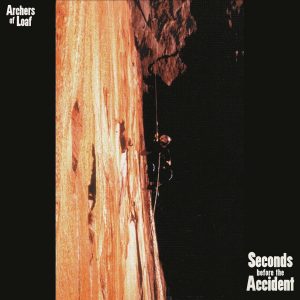 Archers of Loaf
Archers of Loaf
Seconds Before The Accident
Despite being one of the best-loved bands on the ’90s college-rock scene, Chapel Hill’s Archers of Loaf never managed to find mainstream success with their oddly endearing blend of Pavementish guitar-bending and Superchunky punk romanticism. Although the foursome fronted by singer-guitarist Eric Bachmann finally called it quits over a year ago, this 1998 live album is just making its way to the scene. Consider it a belated farewell present. Recorded in their hometown before an adoring, singalong crowd, the original AOL deliver a strong set of tunes that span their career — from the caffeinated jangle of their first single Web in Front to the gentle flow of Dead Red Eyes off their final CD White Trash Heroes. You can miss them, but don’t miss this.
 The Explosion
The Explosion
Flash Flash Flash
Back in the ’70s, Johnny Rotten assured us there would be no future. Turns out he was wrong — at least when it comes to punk rock. Witness this fittingly flammable debut from Boston bomb squad The Explosion, five guys whose combustible sound and fury may well be the next incarnation of punk. Oddly enough, the path to the skate park of the future comes straight from the safety pin-strewn landscape of the past — specifically, the old-school punk-pop of ’70s and ’80s torchbearers like The Buzzcocks and Stiff Little Fingers. Using those bands’ amped-up urgency and anthemic songwriting as a flashpoint, singer Million Dollar Matt Hock and his cohorts factor in the power-chord thrash of metal and poppy hooks of skate bands like Offspring to create a hybrid that has all the raw-boned intensity of prime punk without the posturing and pomposity. “There’s no revolution anymore,” claims Hock. I beg to differ.
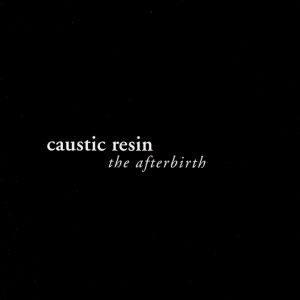 Caustic Resin
Caustic Resin
The Afterbirth
With a name like Caustic Resin and an album title like Afterbirth, you might take these boys for a bunch of blood ‘n’ guts metalheads. You’d be wrong. Like their Boise, Idaho scene-mates Built to Spill, Caustic Resin are a space-rock trio that like nothing better than to crank up, rock out and stretch out on lengthy, loping guitar-jam excursions. Unlike the Neil Young fixation of BTS’s Doug Martsch, however, singer-guitarist Brett Netson, bassist Tom Romich and drummer James Manny have a bit of a jones for druggy ’70s prog-rock, which comes to the forefront often on their fifth album The Afterbirth. Tracks like Longdrive Jam and Violent Game have the same sort of throbbing, midtempo bass funk and effects-laden vocals of, say, The Wall — but thanks to their decidedly more aggressive, stoner-rock leanings, Caustic Resin come off less like Pink Floyd wannabes and more like Roger Waters on steroids. Maybe there’s a little something to that name after all.
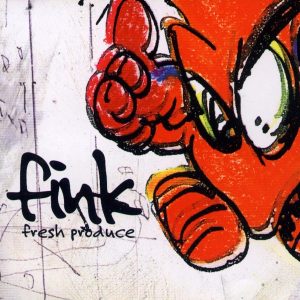 Fink
Fink
Fresh Produce
These days, everybody with a sampler and a crate of vintage wax is an electronica artist. While many are capable-enough technicians, few display the songwriting skills to match their mechanical prowess. Not so with Fink, an acclaimed U.K. producer (he did Bran Van 3000’s Drinking in L.A., among others). Here, he steps out of the shadows and into the spotlight with a world-class mix of fresh-as-advertised grooves. Able to smoothly slice and dice everything from chittering drum ‘n’ bass beats and old movie samples to chillout synths and soulful divas — often in the same track — Fink spins a silky web of sound that segues seamlessly from head-nodding trip-hop (Bristol Switch) to Jamaican dub (Tubb Journey) and even comedic cutups (Celebrity Speedtrap, fuelled by samples from Dukes of Hazzard). In a market overrun with garden-variety DJ discs, Fresh Produce is one tasty morsel.
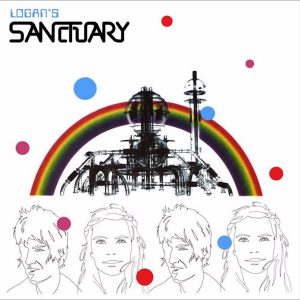 Roger Manning Jr. & Brian Reitzell
Roger Manning Jr. & Brian Reitzell
Logan’s Sanctuary
The lack of a script doesn’t stop Hollywood from making movies, so why should the lack of a movie stop someone from recording a soundtrack? That’s the reasoning of Roger Manning Jr. and Brian Reitzell, the L.A. studio rats behind this would-be score to an imaginary sequel to the ’70s sci-fi shlocker Logan’s Run. Fittingly, it’s a wonder of bassackward futurism, with Manning (a Beck sideman and all-around L.A. MVP) and Reitzell (Air’s touring drummer) using old analog synths and plonk-plonk beatboxes to fashion otherworldly instrumentals full of spaced-out eep-orps, sweeping solar-wind grandeur and robot-disco grooves. To complete the picture, there’s even a vocal pop-rock love theme — Search for Tomorrow, smarmily crooned by Jason Falkner, who somehow manages to enunciate despite having tongue firmly glued in cheek. As fake soundtracks go, I’ll take Logan’s Sanctuary over The Elder any day.
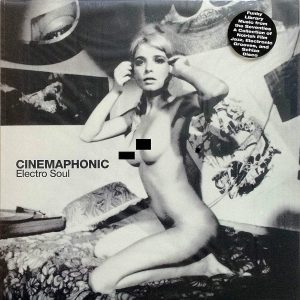
Cinemaphonic: Electro Soul
Various Artists
In the same way that private film libraries supply stock footage of sunsets and other everyday scenes to directors, there are music production houses that create the equivalent of Muzak for movies — ready-made soundtracks just waiting to be used. This oddball set purports to compile some of the finest and funkiest sounds from one such sonic factory’s vault. Although none of these tracks has a date, I bet they’re mostly from between ’65 and ’75, judging by the streetwise blaxploitation grooves, funky-drummer beats, soul-brother melodies, oscillating analog synthesizers and jazz-rock progressions. If much of it sounds like a James Brown or Curtis Mayfield knockoff, well, it’s supposed to — these musicians (including future Fifth of Beethoven disco-technician Walter Murphy) were hired to craft soundalike versions of the day’s hot soundtracks so cost-conscious directors could get the Superfly vibe for a SuperValu price. It’s just too bad nobody ever created movies to go with some of them.
 Sinergy
Sinergy
To Hell & Back
Metalheads who miss the likes of Lee Aaron can get their leather-queen kicks from Sinergy’s Swedish bitch-goddess Kimberly Goss. And I’m not tossing the b-word around lightly — the leadoff track on this Finnish outfit’s debut disc is The Bitch is Back. Sadly, it isn’t a biker-mama remake of the Elton John classic — who wouldn’t want to hear that? — although it is a perfectly acceptable hissy-fit of guitar-shred thrash and operatic metal-pop. Ditto for the rest this satisfying if predictable disc, which traffics in the sort of arpeggio-laden, double bass-driven metal guaranteed to bang the head of anyone who still owns a scratchy copy of Metal Queen. Extra points for the final song Hanging on the Telephone, which actually is a biker-mama remake of the Blondie classic. Now, if they can just get ahold of Elton …
https://youtu.be/bV0PzZxGzbM
 Destruction
Destruction
All Hell Breaks Loose
This brutal German trio exhibit all the blunt-trauma force and blistering, speed-demon frenzy of classic ’80s thrash-metal. And no wonder; they actually formed — and self-destructed — back in the ’80s, and are making a comeback after 10 years of dormancy. Suffice it to say they’re back with a vengeance — these 12 cataclysmic slabs of death-fest metal are the tightest, toughest and most terrifying onslaught to come over the mountains since that guy named Attila. Numbers such as The Final Curtain, Tears of Blood and Visual Prostitution capably spot-weld the intricate precision of Voivod and demonic power of Slayer to the runaway momentum of Kreator, forging a brain-pounding, pulse-pounding, fist-pumping sound so insanely intense and relentlessly over-the-top Metallica would be scared to play it with the lights off. Submit or be destroyed.
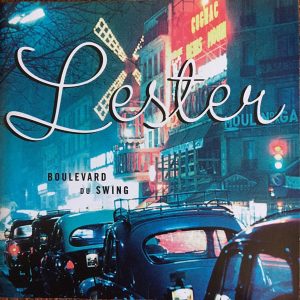 Lester
Lester
Boulevard Du Swing
Another retro-swing cocktail? Perhaps the latest Parisian disco duo? Mais non. As the fortunate few familiar with the wonderfully scrambled oeuvre of New York oddball Lester already know, he’s not the kind to climb on anybody’s bandwagon — not when he’s got his own neon-coloured funmobile to tool around in. On his 1997 delight Lithuanian Luau, the artist formerly known as Phil Dray from The Scene is Now took us to the funhouse at midnight, spewing cotton-candy calliope craziness all the way. This time, the man who puts the mental in instrumental takes a more sophisticated and continental path paved with ambiently cool, lounge-jazz grooves that provide a smooth ride for his surreal, weird-dream keyboard lines, zippy melodies and geek-twang guitar. If Mark Mothersbaugh and Snakefinger could get together with 101 Strings to jam on Les Baxter numbers, you wouldn’t need this disc. But until that day, vive Lester!
 Senor Coconut Y Su Conjunto
Senor Coconut Y Su Conjunto
El Baile Aleman
It doesn’t get any freakier than this: An album of Kraftwerk covers, reinterpreted as Latin cha-chas and merengues. Why? Well, you’d have to ask Senor Coconut, aka Uwe Schmidt, a German techno artist who relocated to Chile a few years back. Either the heat or the rhythm apparently got to him, prompting him to combine the music of his original homeland and his adopted one into the intriguingly weird El Baile Aleman (German Dance). You know what’s weirder? It works — the shakers and timbales, the vibes and horns, the smooth grooves and Latin-lover crooning all provide Kraftwerk classics such as Showroom Dummies, Trans Europe Express and, yes, Autobahn with a beating heart they lacked originally. Not to mention that it’s fun, fun, fun from top to bottom. It may not get any freakier than this, but it seldom gets any cooler, either.
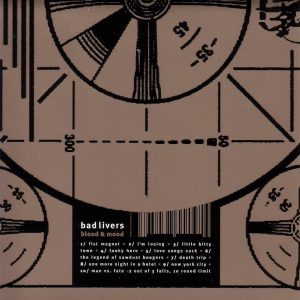 Bad Livers
Bad Livers
Blood & Mood
Once upon a time they were a novelty act — a trio of twisted Austin bluegrassers who took their name from punk band Bad Brains and spiked their demented sets with covers of Metallica, Misfits and Iggy Pop. Now down to a duo led by mutli-instrumentalist Danny Barnes, Bad Livers are no less twisted on their new disc Blood & Mood. But they are a helluva lot more original. Making a screeching, two-wheeled left turn from their previous work, Barnes and bassist Mark Rubin drive straight off the musical map and into a land of backwoods home-studio insanity, where songs are idiosyncratic, jerry-rigged musical contraptions built of old samples, looped drumbeats, acid-trip effects and brilliantly screwy lyrics like, “I’m burning things I find until you miss me.” Part Beck, part Tom Waits and part Violent Femmes, Blood & Mood proves Bad Livers are no novelty act — they’re just novel.
 Devil In A Woodpile
Devil In A Woodpile
Division Street
Should the members of this Chicago folk-blues outfit want to pull a fast one, all they need are a few scratchy records and a sampler. Frankly, if they stuck a bunch of snaps, crackles and pops behind their music, you could mistake these authentic-sounding slices of Americana for some obscure Folkways classic. Of course, they’d never dream of such a hoax, judging by their obvious reverence for their chosen style. It manifests itself in everything from their name (an obscure track by equally obscure harp player Noah Lewis) to their choice of covers (Robert Johnson’s Steady Rollin’ Man, Bill Broonzy’s Wrong Woman) and their up-to-snuff originals (notably the field-holler blues of Before They Get Me Down). But it’s most evident in their spot-on instrumentation and vocals — the lumpy standup bass, 23-skidoo guitars, washboard percussion, tuba and the booming juke-joint baritone of Long John Baldry soundalike Rick (Cookin’) Sherry, who also has the coolest nickname in blues. Hell, with all that vying for space here, there isn’t even room for surface noise.
 Kinnie Starr
Kinnie Starr
Tune-Up
It’s been four years since most of us last heard from Kinnie Starr, but it’s not her fault. Although the Vancouver trip-hopper recorded an album called Mending in 1998, it was never released in North America thanks to the questionable wisdom of her then-bosses at a major label. Now she’s back to running her own show — and if her mind-bending comeback Tune-Up is any sign, she’s out to make up for lost time. Simply put, it could very well be the best Canadian hip-hop disc of the year — a dozen slices of dubby, deep-dish trance fully loaded with scrambled, sampled grooves, subatomic bass tones and textured, tactile loops that serve as a perfect canvas for Kinnie’s hushed, sensual vocals. Tracks like Nearer and Leaving have gentle, flowing grooves that put them in the league of Luscious Jackson — although when Kinnie breaks into a Spanglish rap or delivers a lighthearted rhyme a la De La Soul, it’s obvious she’s in a league of her own. Starr’s career may have been on blocks for a while, but on Tune-Up she’s back firing on all cylinders.



